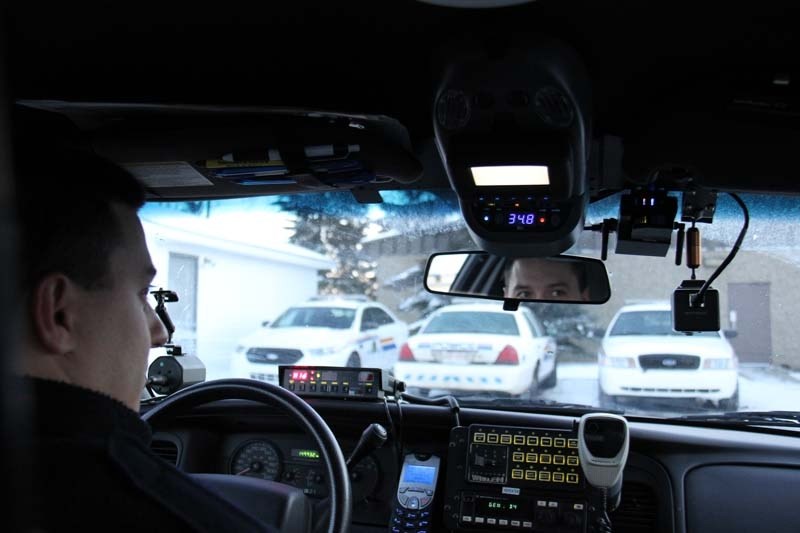For anyone thinking about becoming a police officer, go on a ride-along first, advises Const. Les Rice with Morinville RCMP.
Five years into his career with the force, Rice notes he learned the hard way what "unpredictable" really means and how rural policing does not necessarily include a team of crime scene investigators.
On a bright December afternoon, I accompany Rice on patrol through Morinville and Gibbons. Today he is delivering a subpoena – a document that compels testimony from a witness, as well as a summons – a document that notifies a person of legal proceedings against them.
The summons is being served to a man who is facing charges out of Manitoba for luring a minor over the Internet, sexual assault and sexual interference. He isn't home, so Rice makes a note to come back later.
Finding people that don't want to be found and driving around Gibbons on the lookout for anything abnormal isn't the most exciting part of the job, admits Rice, but a large part of policing is observing.
"A big part of being a police officer is being nosy. If I see a black Mercedes worth $120,000 parked out here, it doesn't look right," he says as we crawl through a residential neighbourhood. "It doesn't fit the mould."
He notes that being an RCMP officer isn't all cops and robbers like it's portrayed in the media.
"For every one hour of fun, it's 10 hours of paper work."
Dirty work
However Rice has had his fair share of "driving fast cars and chasing bad guys," his fair share of dangerous situations, car crashes and even dead bodies.
He recalls taking part in a four-hour police pursuit of a vehicle travelling from Edmonton to St. Paul, as well as a high-speed chase two years ago on New Year's Eve. The latter involved five RCMP officers and 10 Edmonton police.
Rice was in the right place at the right time and laid down the spike belt.
When asked if there was ever a moment he feared for his life, Rice recollects a night shift two years ago on the Alexander First Nation.
Rice responded to a call regarding a group of drunk men fighting in the streets around 10 p.m. When he got to the reserve no one was around. He got a second call of a drunken brawl around 6 a.m. This time there were 15 people fighting in the street, fuelled by alcohol and rivaling house parties.
Rice was the only member on duty as the day shift member was just coming on; backup was coming from St. Albert and Stony Plain. His portable radio wasn't working, the 15:1 ratio wasn't favourable and Rice thought he was done for.
Luckily, many of the men co-operated and Rice was able to talk the others down. The night ended with one man being charged and no one harmed.
Even dirtier work
In his five years at the Morinville detachment Rice estimates he has attended 25 to 30 fatalities, including homicides, sudden deaths and traffic crashes.
Notable cases Rice has been involved in are the murder of Jessica Martel in Morinville in 2009 by her common-law husband, and the stabbing death of Morgan Drew Arcand-Faithful of Alexander First Nation by his cousin last year.
"I've been to some stuff that is pretty horrific," he says.
He vividly describes the scene of a car crash where, as he stepped out of his cruiser, a dismembered limb lay at his feet while the body of the deceased was several feet away.
"It's almost like you have to play Hollywood."
Rice explains he is able to deal with those types of situations by taking a step back. Like a medical examiner he will analyze the incident from a scientific perspective – what was the cause of the death, how is that determined – that's how he stays sane.
Another aspect of policing Rice learned on the job was that there is no team of people in white hazmat suits that come take a dead body away. That is part of the RCMP officer's job.
"It doesn't make sense to tie up an ambulance if the person can't be helped or is beyond help," notes Rice. On more than one occasion he has called the medical examiner's office in Edmonton to pick up a body – the aftermath of a murder, suicide or death by natural causes – and has helped move the body into a bag and onto a gurney.
These are parts of the job they don't tell you about when you're in the academy, he says.




